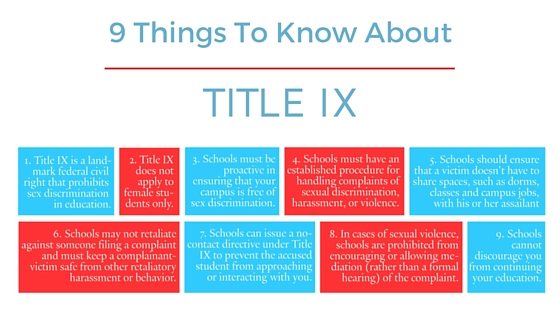What is Title IX?

Who Enforces Title IX?
The United States Department of Education's Office for Civil Rights (OCR) is in charge of enforcing Title IX.
Title IX of the Education Amendments of 1972, 20 U.S.C. §§ 1681 et seq., and its implementing regulations, 34 C.F. R. Part 106, prohibit discrimination on the basis of sex in education programs or activities operated by recipients of federal financial assistance. This prohibition encompasses discrimination based on a student's gender identity, including discrimination based on a student's transgender status.
Sexual harassment, which includes acts of sexual violence, is a form of sex discrimination prohibited by Title IX. These behaviors are clear impediments to creating an educational atmosphere which is free from discrimination. As a result, an institution receiving federal funds must promulgate strategies and policies, which demonstrate its ability to uphold the law and comply with applicable regulations.

1. Title IX is a landmark federal civil right that prohibits sex discrimination in education.
Title IX is not just about sports; it is a prohibition against sex-based discrimination in education. It addresses discrimination against pregnant and parenting students and women in STEM (science, technology, engineering and math) programs. It also addresses sexual harassment, gender-based discrimination and sexual violence. Sexual violence includes attempted or completed rape or sexual assault, as well as sexual harassment, stalking, voyeurism, exhibitionism, verbal or physical sexuality-based threats or abuse, and intimate partner violence.
2. Title Ix does not apply to female students only.
Title IX protects any person from sex-based discrimination, regardless of their real or perceived sex, gender identity, and/or gender expression. Female, male and gender non-conforming students, faculty and staff are protected from any sex-based discrimination, harassment or violence.
3. Your school must be proactive in ensuring that your campus is free of sex discrimination.
You are protected under Title IX even if you do not experience sex discrimination directly. Schools must take immediate steps to address any sex discrimination, sexual harassment or sexual violence on campus to prevent it from affecting students further. If a school knows or reasonably should know about discrimination, harassment or violence that is creating a "hostile environment" for any student, it must act to eliminate it, remedy the harm caused and prevent its recurrence. Schools may not discourage survivors from continuing their education, such as telling them to "take time off" or forcing them to quit a team, club or class. You have the right to remain on campus and have every education program and opportunity available to you.
4. Your school must have an established procedure for handling complaints of sex discrimination, sexual harassment or sexual violence.
Every school must have a Title IX Coordinator who manages complaints. The Coordinator's contact information should be publicly accessible on the school's Web site. If you decide to file a complaint, your school must promptly investigate if regardless of whether you report to the police (through a police investigation may very briefly delay the school's investigation if law enforcement is gathering evidence). A school may not wait for the conclusion of a criminal proceeding and should conclude its own investigation within a semester's time (the 2011 Office of Civil Rights Title IX guidance proposes 60 dyas as an appropriate time-frame). The school should use a "preponderance of the evidence" standard to determine the outcome of a complaint, meaning discipline should result if it is more likely than not that discrimination, harassment and/or violence occurred. The final decision should be provided to you and the accused in writing. Both of you have the right to appeal the decision.
5. Your school must take immediate action to ensure a victim can continue their education free of ongoing sex discrimination, sexual harassment or sexual violence.
Along with issuing a no contact directive to the accused, a school must ensure that any reasonable changes to your housing, class or sports schedule, campus job or extracurricular activity and clubs are made to ensure you can continue your education free from ongoing sex discrimination, sexual harassment or sexual violence. These arrangements can occur BEFORE a formal complaint, investigation, hearing or final decision is made regarding your complaint. It also can CONTINUE after the entire process since you have a right to an education free of sex-based discrimination, harassment or violence. Additionally, these accommodations should not over-burden complainant-victims or limit your educational opportunities; instead, schools can require the accused to likewise change some school activities or classes to ensure there is not ongoing hostile educational environment.
6. Your school may not retaliate against someone filing a complaint and must keep a victim safe from other retaliatory harassment or behavior.
Schools must address complaints of sex discrimination, sexual harassment and sexual violence. As part of this obligation, they issue a no-contact directive or make other accommodations to ensure the accused or a third party does not retaliate for any complaint. Additionally, the school may not take adverse action against the complainant-victim for their complaint. Any retaliation can and should be reported in a formal Title IX complaint to the U.S. Department of Education since it is your right to be free from a hostile educational environment.
7. Your school can issue a no-contact directive under Title IX to prevent the accused student from approaching or interacting with you.
When necessary for student safety, schools can issue a no-contact directive preventing an accused student from directly or indirectly contacting or interacting with you. Campus security or police can and should enforce such directives. This is not a court-issued retraining order, but a school should provide you with information on how to obtain such an order and facilitate that process if you choose to pursue it.
8. In cases of sexual violence, your college is prohibited from encouraging or allowing mediation (rather than a formal hearing) of the complaint.
The 2011 Title IX Guidance clearly prohibits schools from allowing mediation between an accused student and a complainant-victim in sexual violence cases. However, they still may offer such an alternative process for other types of complaints, such as sexual harassment,. Realize it is your choice and you can, and should, seek a disciplinary hearing if you desire such a formal process. Schools are discouraged from allowing the accused to question you during a hearing. If your school allows that, consider getting a nonprofit attorney or other legal advocate to help you through the process and/or file a Title IX complaint with the U.S. Department of Education about that school's hearing process.
9. Your college should not make you pay the costs of certain accommodations that you require in order to continue your education after experiencing violence.
If you need counseling, tutoring and changes to your campus housing or other remedies in order to continue your education, your school should provide these at no cost to you. Similarly, you should not suffer the financial burden of your school's mistakes. If your school fails to take prompt and effective steps to eliminate the violence and prevent its recurrence, your school may be required to reimburse lost tuition and related expenses.
Remember: You can always file a formal Title IX complaint with the U.S. Department of Education or seek legal counsel to enforce your right to education under Title IX. It is your choice how to handle sexual harassment or violence, but realize that you have a right to your education and that your school MUST take steps to ensure you can learn free from a hostile environment.
